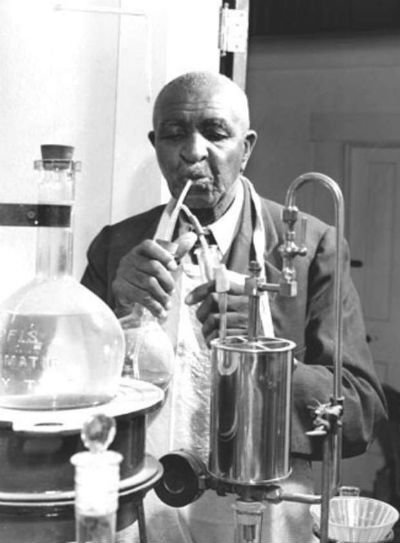The Peanut Man - George Washington Carver

"Ninety-nine percent of the failures come from people who have the habit of making excuses". -George Washington Carver
Traditionally, it is most proper to say that when one seeks to claim success, one will most likely be accomplishing feats while keeping in mind the wealth and fame recognition that follows up. But since not everyone on the face of the earth is identical, you cannot create a statement that will describe each individual – just as George Washington Carver cannot be described with the same noticeable traits of other scientists.
What can you really say about George Washington Carver? Well, the most important fact about Carver is that he came up with 300 different uses for the peanut as well as changing the means of agriculture. Carver lead an unusual life as a black slave, but he overcame his background with hard work and determination. He is known for “The Father of the Peanut Industry”.
Personal Life
George Washington Carver was an African-American scientist who showed many intriguing thoughts about nature throughout his lifespan of being one of the most dedicated scientists. He was born in Diamond, Missouri in 1864 on a plantation. Moses Carver and Susan Carver were his parents and slaves on that plantation. His father was killed in an accident shortly after his birth. Within that same year, his mother was abducted by the midnight raiders.
At a young age, Carver was interested in learning and fascinated by plants. The Carver’s was the ones to first teach George the basics of reading and writing. However, when he turned 11 years old, he went off to a black school in Neosho, Missouri. He ended up doing household chores for a black family in exchange for food and a place to stay.
Throughout all these changes in George’s life, one thing remained constant and that was his passion for plants and agriculture. He worked his way through high school and eventually went on to college. The first college that he attended was Simpson’s College in Iowa, where he made the study of plants – his main focus of study. In 1891, he transferred over to Iowa State University and took up his Bachelor of Science in Botany in 1894 and continued his Masters in Botany as well in 1896. While he was working on his master’s degree, Carver also taught some botany classes and did an experiment in plants. These experiments helped him in later years while he was working at Tuskegee. He was invited by Booker T. Washington to lead and help to change their agriculture department. When he first arrived, the department was just a barn with some cows and chickens. He later changed that into the laboratory and even got the name of the department changed to agricultural sciences. It was there in Tuskegee that Carver came up with his 300 different uses for peanuts and soybeans. He remained there for 47 years.
George Washington Carver died unmarried but successful on January 5, 1943, and buried in Tuskegee, Alabama, United States.
Contributions
George Washington Carver did not do just one thing in the name of science; he came up with many useful ideas and inventions. Along with coming up with 300 different uses for the peanut and 100 different usages for clays and sweet potatoes. He was a very modest man, he had come up with over 500 inventions but he only patented three of them. Most of his inventions were agricultural but he felt there was no need to patent them all. Out of all the money Carver had earned of his lifetime, he never kept much of it.

image source
These are some of his inventions using peanuts: 1.) Soaps for laundry, toilet, and antiseptic 2.) Sweeping compound 3.) Massage oil 4.) Castor substitute 5.) Goiter treatment 6.) Laxatives 7.) Lotions for hand and face 8.) Creams for face, vanishing, baby, and shaving 9.) Face bleach and tan remover 10.) Shampoo 11.) Oil for hair and scalp 12.) Face ointment 13.) Pomades 14.) Glycerin 15.) Face powder 16.) Tetter and dandruff cure 17.) Dyes for leather and cloth 18.) Wood stains 19.) Paints 20.) Paper 21.) Pesticide 22.) Glue 23.) Wood filler 24.) Metal polish 25.) Plastics 26.) Axel grease 27.) Lubricating oil 28.) Lamp oil 29.) Diesel fuel 30.) Ink for printers and writing 31.) Rubber 32.) Coke 33.) Washing powder 34.) Linoleum 35.) Wall boards 36.) Insulating board 37.) Charcoal from shell 38.) Nitroglycerin 39.) Soil conditioner
These are some of his inventions using sweet potatoes: 1.) Stains 2.) Dyes 3.) Paints 4.) Library Paste 5.) Alcohol 6.) Rubber Compound 7.) Writing ink 8.) Shoe blacking 9.) Fillers for wood 10.) Synthetic cotton and sill 11.) Paper from vines
According to the National Peanut Board, Carver published the research bulletin, “How to Grow the Peanut and 105 Ways of Preparing it For Human Consumption”. During that time, it had destroyed the cotton crop and many farmers had turned the peanuts as a cash crop. Alabama residents saw cotton oil mills converted to produce peanut oil. It means that farmers could thrive on – livestock could eat the peanut plant and crops could feed their families that were not sold. Carver and the peanut helped save the economy of the southern part of the United States.
After lifetime achievements, recognition and awards, he took a holistic approach to knowledge, which embraced faith and inquiry in a unified quest for truth. His belief in service was a direct outgrowth and expression of his inquiry and commitment. One of his favorite sayings was: “It is not the style of clothes one wears, neither the kind of automobile one drives nor the amount of money one has in the bank, that counts. This means nothing. It is simply service that measures success.”
Final Thoughts
I found his work to be very interesting. I thought it was amazing that he overcame his background to become what he is. I found his life can be an inspiration to others, especially to the young people. The life of Carver reminds us that such abuses will continue until we reunite ethical and technical reasoning in the context of a profound faith that holds all inquiry and action accountable.
